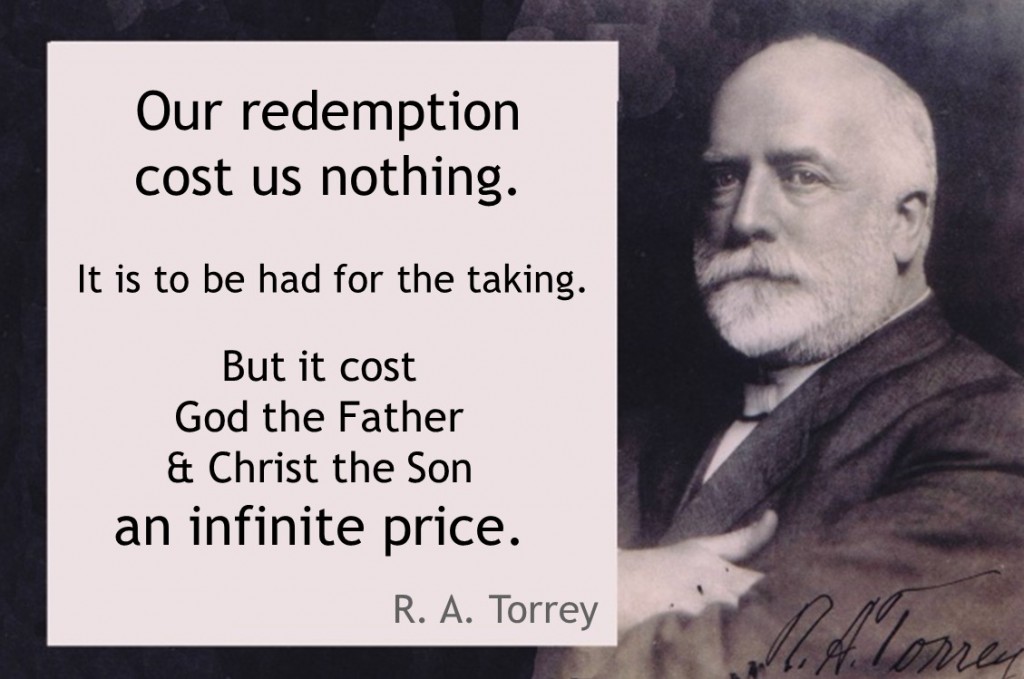In whom we have redemption through his blood, the forgiveness of sins, according to the riches of his grace; ~Ephesians 1:7
In this Beloved One “we have our redemption,” i.e., deliverance, first from the guilt of sin, and afterwards from its power and its penal consequences. The primary thought of the word “redemption” is deliverance by the payment of a ransom. The thought of a ransom paid often disappears in the usage of the word and only the thought of deliverance alone remains, but in the words before us the thought of a ransom paid for our deliverance lingers in the word. The price paid was “His blood,” the outpoured life of Jesus Christ (cf. I Peter 1:18, 19). It was the highest price that could be paid. Our redemption cost us nothing, it is to be had for the taking, but it cost God the Father and Christ the Son an infinite price.
As to the exact significance of “through His blood,” Bishop Moule puts it well:
On this great subject it is enough here to say that a careful review of New Testament passages under the word blood will show that the prevalent and leading ideas associated with it, in religious connections, are expiation of guilt, ransom of person and ratification of covenant. In all these can be found the uniting idea of forfeiture of life as the due of sin.”
The death of Christ was the price He paid to redeem us (II Cor. 5:21; Gal. 3:13). It was a “propitiation,” i.e. the means of appeasing God’s holy wrath at sin (see Rom. 3:25, R. V.; I John 2:2). The stroke that was due to us God “made to light upon Him,” our voluntary representative (Isa. 53:6, 8, R. V.). God “made to strike” is a still more accurate rendering than the “made to light”, the marginal translation of the Hebrew given in the Revised Version (see also John 10:11, 18, 19). God took the penalty of sin into His own heart and forgave us.
The fundamental thing secured by our redemption is “the forgiveness of our trespasses” (R. V.). Two other blessings are wrapped up in that. “Trespasses” means a “falling out,” or “falling alongside,” i.e. a falling out, or departure from the straight path of God’s will, into forbidden, wicked, and dark by-paths that end in death. Through Christ’s atoning blood all these wicked departures are forgiven. The Greek word translated “forgiveness” means “dismissal,” “sending away.” The thought is that because of the atoning blood of Christ God has forever dismissed our sins from His mind (cf. Ps. 103:12). Through Christ, our scapegoat, our sins have been taken away into a land uninhabited, where they shall never be heard from again (Lev. 16:8-10, 21, 22). Forgiveness of sins is not something the believer must do something to get, it is something we already have, “we have our redemption through His blood, the forgiveness of our trespasses.” We do not hope to be forgiven, we are forgiven.
All this is “according to the riches of His grace.” “Riches,” is a favorite word with Paul, especially in this epistle and the epistle to the Romans (cf. v. 18; ch. 2:4, 7; 3:8, 16; Rom. 2:4; 9:23; 10:12; 11:12, 33; I Cor 1:5; II Cor. 8:9; 9:11; Phil. 4:19; Col. 1:27; 2:2). There are no greater “riches” than “the riches of His grace;” they lead to and involve “the riches of His glory” (cf. Phil. 4:19). Moule’s final comment on this verse is: “Observe in this verse the contrasted but harmonious aspects of the gift of redemption; it flows from a divine wealth of love and goodness; it flows through, not any channel, but the death of Christ.”
[This was written by R.A. Torrey for his regular column, “Daily Devotional Studies in the New Testament: For Individual Meditation and Family Worship,” published regularly in Biola’s magazine The King’s Business from 1915-1918. These comments on Ephesians have never been republished since their original appearance there in the June, 1918 issue.]

